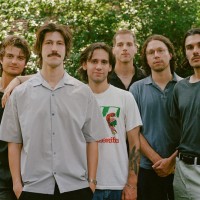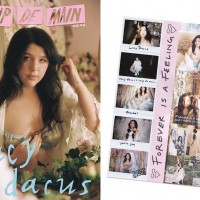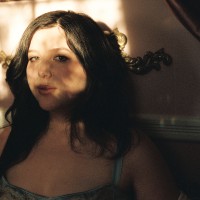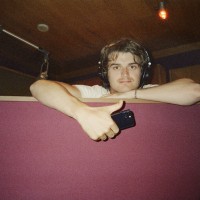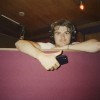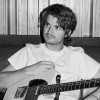Interview: Quentin Tarantino on his new film, 'The Hateful Eight'.
Interview: Quentin Tarantino on his new film, 'The Hateful Eight'.
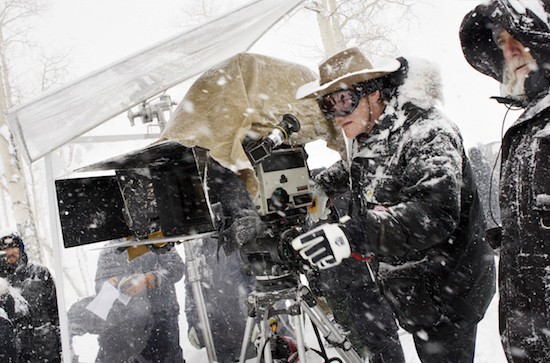
"You never know," agrees illustrious director Quentin Tarantino, chuckling as I place two cellphones down in front of him - both set to Voice Memo mode. He's amused by my cautious paranoia, and unexpectedly, his good humour stretches the entirety of our fifteen-minute interview. I'm genuinely astonished when he says it was a pleasure to talk to me, and bids me an apologetic farewell, "You had really good questions! Some of them stumped me and I didn't want to waste your time."
As the director of classics such as 'Pulp Fiction', 'Reservoir Dogs' and the 'Kill Bill' films, Tarantino needs no introduction. And nor does his notoriety as an antagonistic interviewee - my favourite (viewed over 3.6 million times on YouTube), being, "Quentin Tarantino interview: I'm shutting your butt down!".
While Tarantino was in New Zealand recently to promote his new film, 'The Hateful Eight', Coup De Main spoke to him about the 'acts' of his life, Bob Dylan, and his Checkpoint Charlie...
"...I surprised myself, that I was in the tissue of the character enough, that I could actually come up with something that I didn't actually feel or didn't believe."

COUP DE MAIN: You've said that you write to music - that you'll find the beat of a movie from records in your vinyl collection. Was there an album or song that inspired the beginning of your writing process for 'The Hateful Eight'?
QUENTIN TARANTINO: Yes, but this is one of those cases where a lot of the stuff that I had in mind didn't quite work out. This is one of the ones where I didn't really-- I did that, but one of the songs that stayed in my head that I really considered a lot was an old folk song called 'John Brown' - not the abolitionist John Brown, but the one that Bob Dylan has covered and sung before. It's about a boy coming home from the Civil War, or maybe World War I even, and about his Mother seeing him all destroyed. I ended up not using it, but I always imagined that the opening-credits would be the stagecoach riding with that song going on. But this was one that I didn't really have a lot of music for in that way, because I wasn't planning on using that many songs, frankly, in this one. So actually, kind of in a weird way, the dialogue was the music.
CDM: Your film-making style has influenced so many music videos across so many different musical genres - would you ever want to direct a music video?
QUENTIN: Not really, I'm not a huge big fan of them. Part of the thing is, I like my song-sequences in my movies, but one of the things I like about them, is I get in and I get out. I don't have to play the song all the way to the very end - I use it while it's good and while it's cool and while it's exciting, and then I get out.
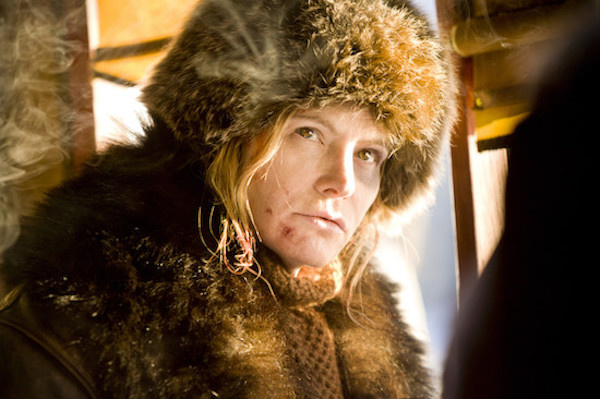
CDM: Both Jennifer Jason Leigh and Demián Bichir perform musical numbers in 'The Hateful Eight'. When you were casting those characters, did you specifically look for actors that were also musical?
QUENTIN: No. And in both cases-- when I talked to Demián, I was like, "Can you play piano?" He goes, "Nope... but I'll learn." <laughs> And in the case of Jennifer, I got the idea of Jennifer doing it from a film she did, 'Georgia', where she was a rock-singer and I really liked the way she sang. In fact, I even remember talking to her about it, "Everybody talks about you in that movie like you can't sing, but I thought you sang really well." She goes, "Oh! Well, thank you." And so I go, "Can you play the guitar?" She goes, "Nope, I can't. But I've always looked for an excuse to learn." And so she jumped in with both feet. And the same thing with Demián. Demián actually just practiced it and got to do it really well. Unfortunately, every time I have somebody play an instrument, it's always like, they don't know how to do it. I cut the scene out, but there was a moment where Christoph Waltz plays the piano in 'Django [Unchained]' - Jamie [Foxx] is a magnificent piano-player but there's never a moment where Django plays the piano.
CDM: If Daisy Domergue were to make a mixtape, what are five songs you think would be on there?
QUENTIN: Gosh. Well, definitely 'Jim Jones At Botany Bay' <laughs> - and by the way, speaking of which though, where I got that idea for that is, at one point I'd even thought about using that as a song on the soundtrack before I had her sing it. It wasn't even written in the script, I just kind of decided in pre-production. I thought, 'What if she were to actually just pick up a guitar and play it?' I don't know if I'll be able to come up with the other four, but I like that question, but I'll waste too much of your time trying to figure it out.
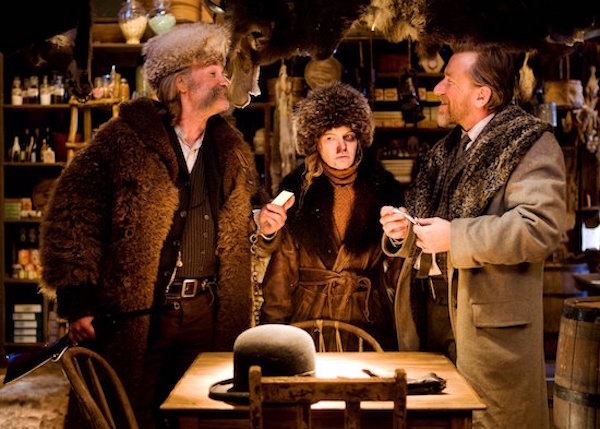
CDM: Everyone in the film has nicknames like Six-Horse Judy and The Hangman. As Quentin Tarantino, what would be your Hateful Eight-esque nickname?
QUENTIN: Me?! Oh gosh. Did they give me one on the movie? I don't think so... I'm wondering if the crew had some sort of nickname for me. <laughs to himself> Six-Horse Judy! I am blanking at anything truly funny, so I'll just say, 'No Phone Quentin'. <laughs>
CDM: If you could be pen pals with anyone living or dead and have a real 'Lincoln Letter', who would you want to write to you?
QUENTIN: Wow, that's a good question... Hmmm... You're asking good questions, I'm almost afraid I'm wasting your time by trying to give you thoughtful answers. Okay... a letter from them? Or from me to them?
CDM: To you. Like Major Marquis Warren's letter.
QUENTIN: Bob Dylan!
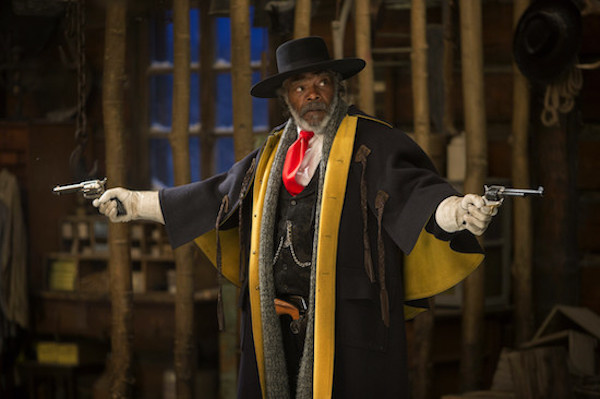
CDM: When you look back on your life, do you segment it into chapters like in 'The Hateful Eight'? Or more like a Venn Diagram?
QUENTIN: More like acts. In fact, the husband of my Editor who passed away, Sally Menke, her husband was Dean Parisot who's a director - he did 'Galaxy Quest', amongst other movies - and he was joking with me when I did 'Reservoir Dogs' and then 'Pulp Fiction' about how I was just this video-store guy and now I was actually making movies and stuff. He was like, "Okaayyy! Quentin's Life Part II." <snaps fingers> And then at a certain point when I was in a different place, "Okaayyy! Quentin's Life Part III." <snaps fingers> And then we'd all just had a little celebration, I'd got my hands and feet in the Grauman's Chinese cement a couple weeks ago, and him and the kids came down for this little celebration that we had and he goes, "Is this Quentin's Life Part IV?" I go, "Yeah, I think so!" <laughs>
CDM: What do you feel would be the title-heading for this time in your life right now?
QUENTIN: Wow... I'll take a spin from 'Domergue's Got A Secret' - 'Tarantino Navigates The Path'.
CDM: The job title 'Checkpoint Charlie' stood out to me in the credits of the film, so I googled and found an interview with Tim Roth in which he explained it was your phone check point on-set. What was the first movie that you introduced this on-set and why is it so important to you?
QUENTIN: The first movie was 'Kill Bill'. Basically, a phone rang during a scene with Michael Madsen and ruined the scene and threw the whole rest of the night in a bad way. I was really fucking pissed off and then at one point, my A.D. [William Paul Clark] goes, "Quentin! We're giving them these phones, we can take them away." I was like, "Yes, let's do it." And then from that point on, we had a complete ban on cellphones and almost every kind of electronics. There was another time, where all of a sudden shooting the scene you hear the <makes a whirring sound>, when you turn on a laptop or something. I don't want any fucking electronics on my set. Ever since! Now, back then, that was done - as bad as it was, it was a situation where we were giving them the phones. Those were the phones in 2002, or whatever the deal was. Now, with things like this, everybody has that shit. And it still ultimately is about not ruining the scene, because it's not about you turning it off - I don't want to test your memory. If you fuck up my scene, you're fired; that's the deal. That's not what we're here to do. But it's ended up having a more profound aspect than even that, than even just circumventing somebody ruining the scene. Because what's happened, is these smartphones are so prevalent now on sets, that people really aren't even there, when they're there. They're not 100% present. They're on the set, and they're going through shit, they're looking up stuff, they're updating their Facebook page, and they're not present. People aren't talking. It used to be, crews were families and you hung out together. But now, everyone's kind of by themselves doing their own thing to some degree or another, and then they put 'em down when they all have to do something in unison. And by banning them from the set, the whole crew tends to work tighter with each other. And then it just becomes a thing where people kind of fall in love with the idea, 'This is the film-industry that I signed up for! This is really wonderful.' But then they go back to another set and everybody's on their cellphone, everyone's in their own little box, and they get depressed about it.

CDM: Chris Mannix makes a joke that the Major and John Ruth are having a "Bountyhunter's Picnic" inside their stagecoach. Obviously you see your movie-making colleagues at awards shows and other industry events, but do you ever hang out with other directors? Are there Director's Picnics?
QUENTIN: Yeah, yeah! I definitely have some colleagues that I respect, and we get together from time to time. But I actually have just like genuine friends. Paul Thomas Anderson is a genuine friend. Robert Rodriguez is a genuine friend. Rick [Richard] Linklater is a genuine friend. Eli Roth is a genuine friend. And so is Edgar Wright.
CDM: The self-preservation dialogue in the final chapter of 'The Hateful Eight' is really interesting - especially that Chris Mannix plays such an important role in it, as he's portrayed himself as a bit of a fool. Do you think that the best survival strategy is to be under-estimated rather than overrated?
QUENTIN: Probably as far as a survival strategy, that's actually probably a pretty good survival-- literally, if you're going to break it down to that sentence, a survival strategy, I would probably say yes, actually. Especially in a situation like that. Because there is an aspect of-- there's a few characters in this movie, they really hide in plain sight, if you know what I mean? It is also interesting to me... A thing when I was writing the movie was, I hate The Confederate cause. I've always felt that they are our Nazis and the rebel flag was our swastika. So I totally have no love for that whole romance for that Antebellum time period. But at the same time, I don't judge my characters, and that's my job not to judge them. It's my job to treat them with respect and to just look at it from their point of view. Even Christoph Waltz's character, Colonel Landa in 'Inglourious Basterds', I never judged him. He was who he was, and everyone has their reasons, and it's not my job to judge them. However, one of the things I was the most proudest about, is when Mannix and Warren had that argument in the stagecoach. Mannix comes up with a pretty good defence for why his Dad did what he did - i.e. the unconditional surrender; fighting against that. When I wrote that, I was like, 'Whoah!' Because that's not how I feel. But that is a good defence. That actually makes sense and you can understand that to some degree or another. And I surprised myself, that I was in the tissue of the character enough, that I could actually come up with something that I didn't actually feel or didn't believe. And actually be semi sort of convinced at that given moment of his methodology.
CDM: Everyone always thinks that their own actions are justified.
QUENTIN: Exactly!
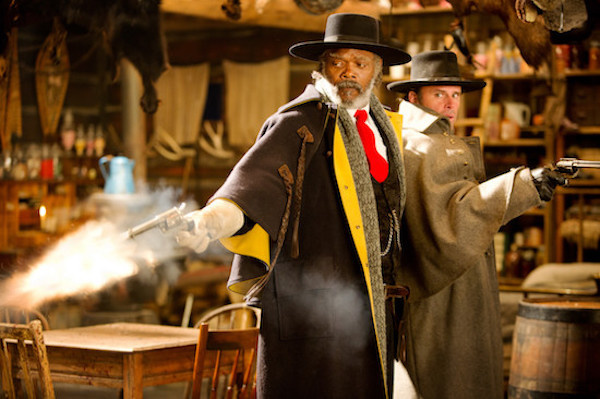
'The Hateful Eight' is playing now in New Zealand cinemas.
Watch a trailer for 'The Hateful Eight' below...









